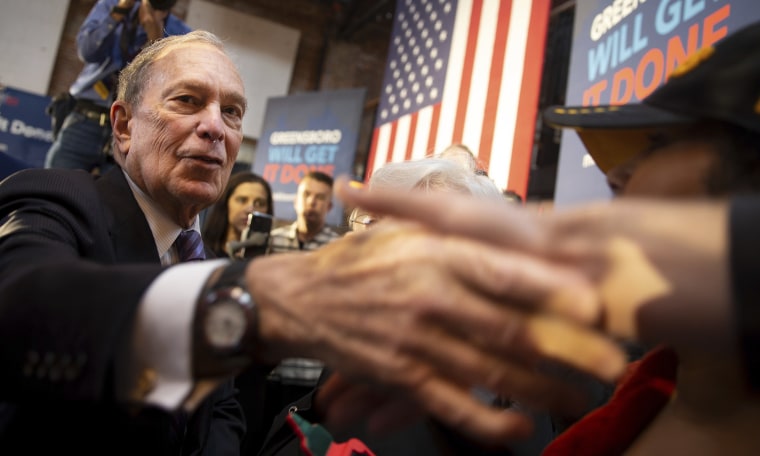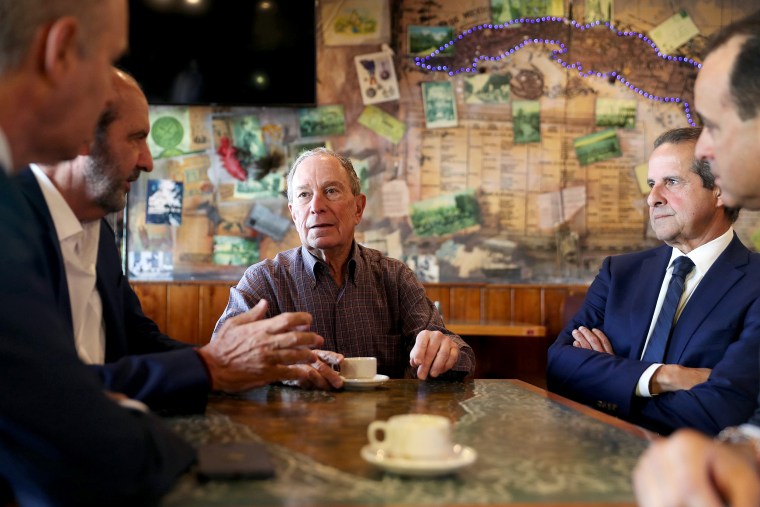MIAMI — With it finally time for Mike Bloomberg to face voters, he said Tuesday that the only way he can win the Democratic nomination is at a contested Democratic National Convention this summer.
Speaking at a Miami campaign office, Bloomberg said: "Well, I don't think that I can win any other ways."
"But contested convention is a democratic process," he added. "There are rules in the Democratic Party of how you go about this. And I did see Bernie Sanders said all of a sudden he didn't want to follow the rules. ... I find it offensive that Bernie Sanders, who the last time he ran was in favor of that kind of a convention, and now was opposed to it. I guess where you stand depends on where you sit."
His remarks come as Joe Biden has begun to consolidate the moderate Democratic primary field aimed at taking on Sanders and as Bloomberg faces increased calls to join the likes of Pete Buttigieg and Amy Klobuchar, who ended their candidacies this week and backed Biden.
Bloomberg bristled at the suggestion he could be taking votes away from Biden and, as a result, boosting Sanders beginning with the Super Tuesday contests. "Joe's taking votes away from me," Bloomberg told reporters, adding that "it goes in both directions."
Download the NBC News app for breaking news and politics
The former New York mayor also said he did not know whether he would win any of the 14 states and one U.S. territory voting Tuesday, saying he didn't need to, instead pointing to a delegate haul he could bring in after those primaries.
In Virginia on Monday, Bloomberg said at a Fox News town hall that the convention presents the opportunity for "horse-trading, and everybody decides to compromise on — it doesn't even have to be one of the two leading candidates."
"It could be somebody that had only a small number of delegates," he said.
Bloomberg has spent lavishly — more than $500 million — to boost his upstart campaign. He bypassed the first four early-voting states and has focused his efforts on Super Tuesday, when roughly one-third of the total pledged delegates are on the line.
Bloomberg is spending Tuesday on a tour of Florida, holding a handful of events in the crucial state ahead of its primary later this month. He will also visit Michigan and Pennsylvania later this week before returning to Florida.
Bolstered by an advertising campaign unprecedented in a presidential primary and large-scale ground operations in states such as California, North Carolina, Texas and Virginia, he surged in polling before a pair of shaky debate performances appeared to stall his momentum.
But as the date has arrived for Bloomberg to find out what his standing really is in the Democratic primary campaign, his candidacy has met its toughest challenge yet — Biden's sudden post-South Carolina consolidation of the non-Sanders lane. Days after his resounding victory in the state, Biden was bolstered by not only the Klobuchar and Buttigieg endorsements, but also those of former Senate Minority Leader Harry Reid, D-Nev., and former Rep. Beto O'Rourke of Texas, who earlier dropped out of the presidential race.
Just a few weeks ago, Bloomberg's campaign was pushing for everyone to quickly drop out so he could take on Sanders. Now, Bloomberg, who entered the contest in part because Biden had shown some weaknesses late last year, is faced with the potential of serving as a spoiler who tamps down Biden's ability to win the nomination.
Speaking in Virginia on Monday, Bloomberg made it clear he doesn't see himself as such.
"I've won three elections so far," he said at a canvass kickoff in Manassas, referring to his victories in New York mayoral races. "I don't plan to start losing now."
One Democratic aide who spoke with NBC News on Monday said "pressure is mounting" on Bloomberg from other party moderates who wanted him to stand down on Super Tuesday, describing the Bloomberg campaign as fielding a lot of "incoming" from Democrats. But two senior Bloomberg campaign officials said he isn't going to leave the race before Super Tuesday results come in.
And his campaign also sees an upside to Klobuchar's and Buttigieg's dropping out, even if they have backed Biden. Should a small number of their supporters move over to Bloomberg's camp, he could get over the 15 percent threshold needed to collect delegates in states where he may have otherwise had problems.

The billionaire media mogul will seemingly have to carve a larger chunk of support away from Biden to appear viable in the months to come.
Both candidates delivered speeches Sunday at Brown Chapel AME Church in Selma, Alabama. Biden, seated at the pulpit besides figures such as the Rev. Al Sharpton and 2018 Georgia gubernatorial candidate Stacey Abrams, was greeted with loud cheers and clapping. On the other hand, Bloomberg, seated in the first pew, watched as a handful of churchgoers turned their backs on him during his speech.
Bloomberg received a much different greeting Monday at the American Israel Public Affairs Committee gathering in Washington, D.C., where he was met with a standing ovation. He was the only Democratic candidate to address the group in person, although Biden and Klobuchar provided taped speeches.
Later in the day, his Fox News town hall event descended into chaos when Bloomberg was interrupted by protesters blasting him for his overseeing of stop-and-frisk policing in New York City and his company's nondisclosure agreements with women who have worked for him. Soon after, other members of the audience began arguing over Bloomberg's positions on gun control and abortion rights.
His campaign used the moment to highlight his centrist credentials.
"He's a moderate," a campaign aide told reporters, "protested by the left and the right."


